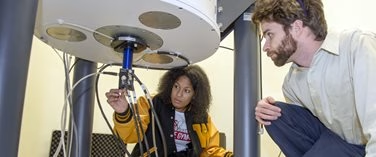The Department of Chemistry at WVSU offers three Bachelor of Science in Chemistry degree options:
- ACS Certified
- Applied Chemistry
- Pre-Medical/Pre-Pharmacy Science
Details about this 4-year Bachelor of Science program options:
Option A – ACS Certified (Click here for a curriculum sheet)
The Bachelor of Science in Chemistry ACS Certified option is approved by the Committee on Professional Training of the American Chemical Society (ACS). Depending on the option chosen, students are prepared for graduate studies in chemistry, or immediate employment in industry, or entry into professional schools such as those of medicine, dentistry, and pharmacy.
- Follows the guidelines of the ACS Committee on Professional Training
- Provides the necessary background for admission to graduate programs in chemistry
- Provides a superior background for students wishing to pursue a career in the chemical industry
- Curriculum includes directed research with a chosen faculty member
Option B – Applied Chemistry (Click here for a curriculum sheet)
- Provides background for students interested in many scientific fields
- Prepares the students for entry-level chemistry positions
Option C – Pre-Medical/Pre-Pharmacy (Click here for a curriculum sheet)
Prepares the students for pursuing medical and health-related careers
Provides the students with a strong background in chemistry and biology
Prepares the students for admission to medical and/or pharmacy school
